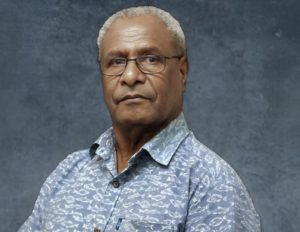Faculty of Built Environment
The Faculty of Built Environment specializes in disciplines such as Architecture and Urban and Regional Planning, providing transformative education

Professor Dr. C. K. Gonduan, Dean of Faculty of Built Environment
Welcome to the Faculty of Built Environment at the Papua New Guinea University of Technology (PNGUoT)!
As Dean of Faculty, along with the Heads of Schools, the Academic Faculty, the Technical Staff, and Students, I welcome you to the Faculty of Built Environment. It is an honor to be in this position to facilitate what is required of this Office, and to begin mapping-out the progressive changes, rewards as well as challenges that will come along.
The task to lead the faculty demands commitment, astute stewardship, wisdom with that, responsibility. This is an equation that any leadership is tasked to take-on, and begin to progressively find meaningful workability and deliverables that are required, and demanded in the marketplace. I am mindful of who is enrolling as students in this Faculty. These are not just students pursuing to earn a degree, but representatives and children of their families, clansmen, tribes and nation. I am vividly reminded of the nations first Prime Minister on that promising 1975 Independence Day Flag Raising Ceremony when commented, and asked, by a departing colonial master – “you have no engineers, no accountants, no lawyers, no architects, no surveyors and the like … who is going to build your country…”. The young Prime Minister simply replied with great foresight “… you see these girls… they will give birth to my engineers, doctors and lawyers…”and so is that uttered legacy taking shape today. This is our collective mandate as teachers, and students, in the Faculty. This can be only successfully progressed and achieved through collective effort by all who are taking respective tasks and responsibilities in the Faculty and the University.
The Faculty currently comprises of two of the pioneer academic establishments of the University.
- The School of Architecture and Construction Management.
- The School of Surveying and Land Studies.
The above offerings are not limited; there are plans currently, being developed to complement the above platforms that will enable Postgraduate program that will draw from the Schools and others that will partner with the University, the Faculty and the Schools.
Past Performance
The Schools have, with great pride graduated many who have, and are contributing to industries and communities, within Papua New Guinea (PNG), the Region and, around the world. This is testament to the quality, of the programs, curriculum, the academic faculty, research and development and scholarship that extends beyond the University, the lecture halls, the seminar, and forums, the practicums, laboratories, examinations and the sleepless nights of the PNGUoT learning process. For this, we at the Faculty are humbled, and yet, do not shy-away of the pride we have on our graduates who have become bacons, stewards and champions in their collective contribution to society.
Current Developments
The Faculty and the Schools have re-strategized under the Institutional Strategy 2020-2024 and beyond to become, smarter and better in academic delivery, research, development and publication, community outreach and innovative consultancy service. The Faculty is also mindful of being responsible and being relevant to the communities being served. Importantly, to find meaningful solutioning for the disparity between the urban and the rural communities and the need to enable greater capacity and capability to address development challenges in these two sectors. The knowledge and learnedness in the Faculty must contribute to bring better quality of living standards and life in these communities.
The continuous advances in socio-cultural, socio-economic evolution, eco-technological transitional dynamics, and the rapid AI transformational development into the digital technological space, it is bringing challenges to the learning, processing and delivery platforms. The Faculty and Schools are receptive and are progressively adapting to these changes and challenges and is facing-up to these with commitment and remarkable knowhow along with rapid-skill-upgrades.
Recent program(s) and curriculum designs accommodated and are progressively addressing these evolutional dynamics in the knowledge-economy space. The Schools have pursued the need for program curriculum benchmarking with advice and input from our industrial partners, and from similar academic programs abroad. Under this, all the programs, course and syllabi has been designed, developed and now implemented to meet the above challenges and changes. This is progressing toward eventual accreditation of the academic programs with the Australasian Region and beyond. The Architecture program has benchmarked with the and Association of Architecture Schools of Australasia (AASA) under the Bologna Accord and Construction Management program with Australian Institute of Building Schools (AIB). They are now progressing to pursue accreditation by 2025-2026. The School of Surveying and Land Studies is currently making the needed requirements (benchmarking and accreditation) in meeting this need. A number of undergraduate and postgraduate programs are currently offered online and is gaining momentum on demand.
The Future
Amidst all these developments, the Faculty of Built Environment is embracing, challenges and opportunities and is committed to building academic excellence with innovative customization of existing capabilities in adapting technologies, that will make and develop meaningful deliverables in streamlining positive change in communities here and abroad. Built environment is about – changing the status quo for a better outcome – this would become the mantra of the faculty.
The Faculty of Built Environment apart from the undergraduate programs, is also offering a number of Masters and Doctor of Philosophy programs and, is pursuing to introduce a number of new additions to our two Schools, such as – Masters in Urban Planning and Settlement Development Studies, and Bachelor in Quantity Surveying.
Delivery of knowledge is a primum attribute in a rapidly developing society like Papua New Guinea and the smaller Pacific Countries. Pedagogical affluence and delivery platforms are progressively upgraded via digitalized platforms in which most students have adapted and have customized easily. Nonetheless, there still is much more delivery infrastructure that needs to be adapted and customized to sync with the development trends and changing dynamics taking place.
The above synopsis gives a brief snapshot of the Faculty. I have all the confidence, and with foresight and commitment on my part as Dean; the path ahead, though unknown, wise planning and creative laying of the needed foundation has the potential, to enable greater capacity and capability tomorrow. The academic faculty, with the physical infrastructure available have done much in the past, and given a little more boost, the potential- kinetics is beyond our limitations. You are invited to explore the faculty makeup and see what the Schools offerings. We hope you make a choice and take that choice with us seriously. The Faculty is here for you.
Professor Dr. C. K. Gonduan
Dean – Faculty of Built Environment

School of Architecture and Construction Management
Contribute to sustainable and aesthetically pleasing structures that meet evolving societal needs

School of Surveying and Land Studies
Engage in geospatial technology, land surveying, and land management
